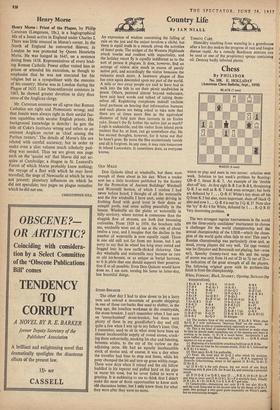Henry Morse
Henry Morse : Priest of the Plague, by Philip Caraman (Longmans, 18s.), is a hagiographical life of a Jesuit active in England under Charles L There was little unusual in Morse's career. In the North of England he converted thieves; in London he was protected by Queen Henrietta Maria. He was hanged in 1645, on a sentence dating from 1638. Representatives of every lead- ing Roman Catholic Power either visited him in prison or attended his execution, as though to emphasise that he was not executed for his religion but as a sympathiser with the enemies of his country. Morse was in London during the Plague of 1635. Like Nonconformist ministers in 1665, he showed greater devotion to duty than some of the Anglican clergy.
Mr. Caraman assumes we all agree that Roman Catholics are right and Protestants wrong; and that Jesuits were always right in their sordid fac- tion squabbles with secular English priests. His background knowledge is sketchy : he gets the title of Coke's Institutes wrong and refers to an eminent Anglican rector as 'chief among the Puritan ranters.' The details of Morse's life are related with careful accuracy; but in order to make even a slim volume much scholarly pad- ding was needed. Thus we are given one page each on the 'quaint wit' that Morse did not ac- quire at Cambridge; a dragon in St. Leonard's Forest of which Morse probably knew nothing; the voyage of a fleet with which he may have travelled; the siege of Newcastle at which he was not present; planetary influences on which he did not speculate; two pages on plague remedies which he did not use.
CHRISTOPHER HILL


































 Previous page
Previous page